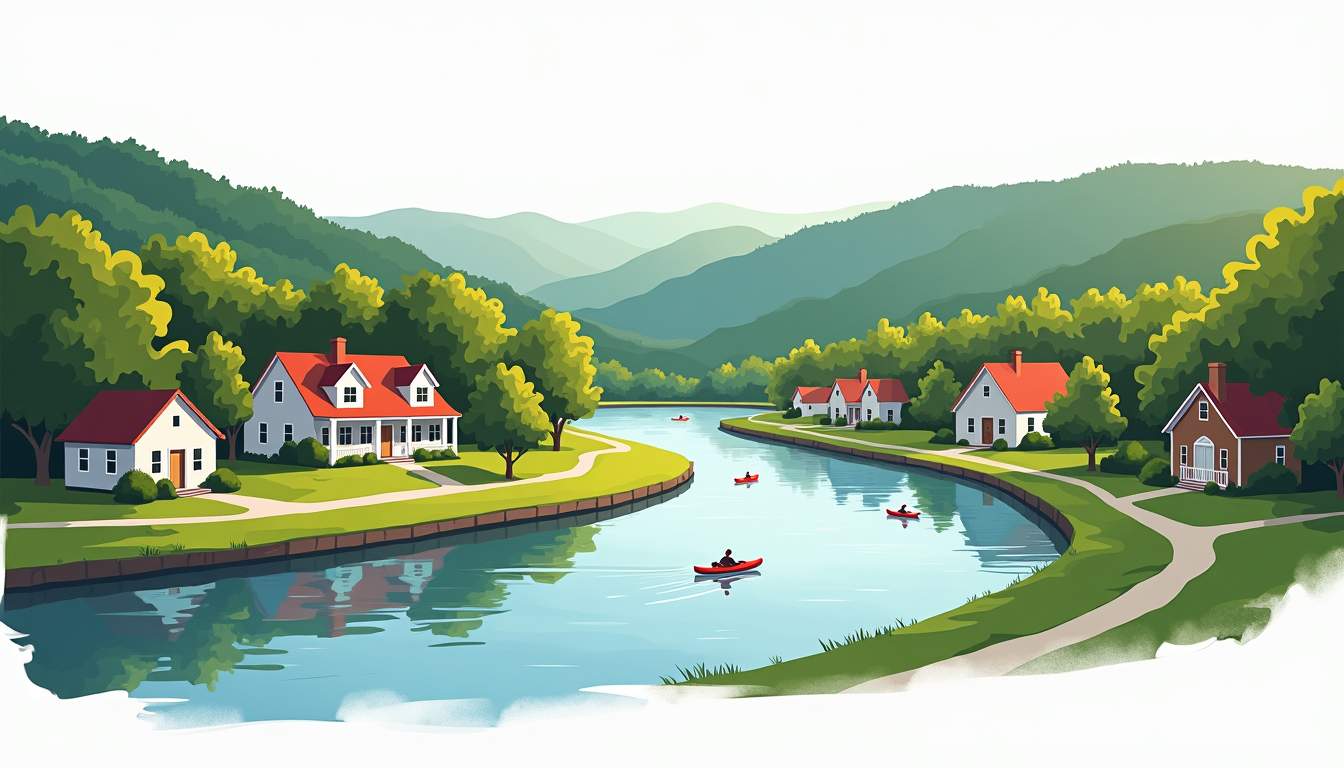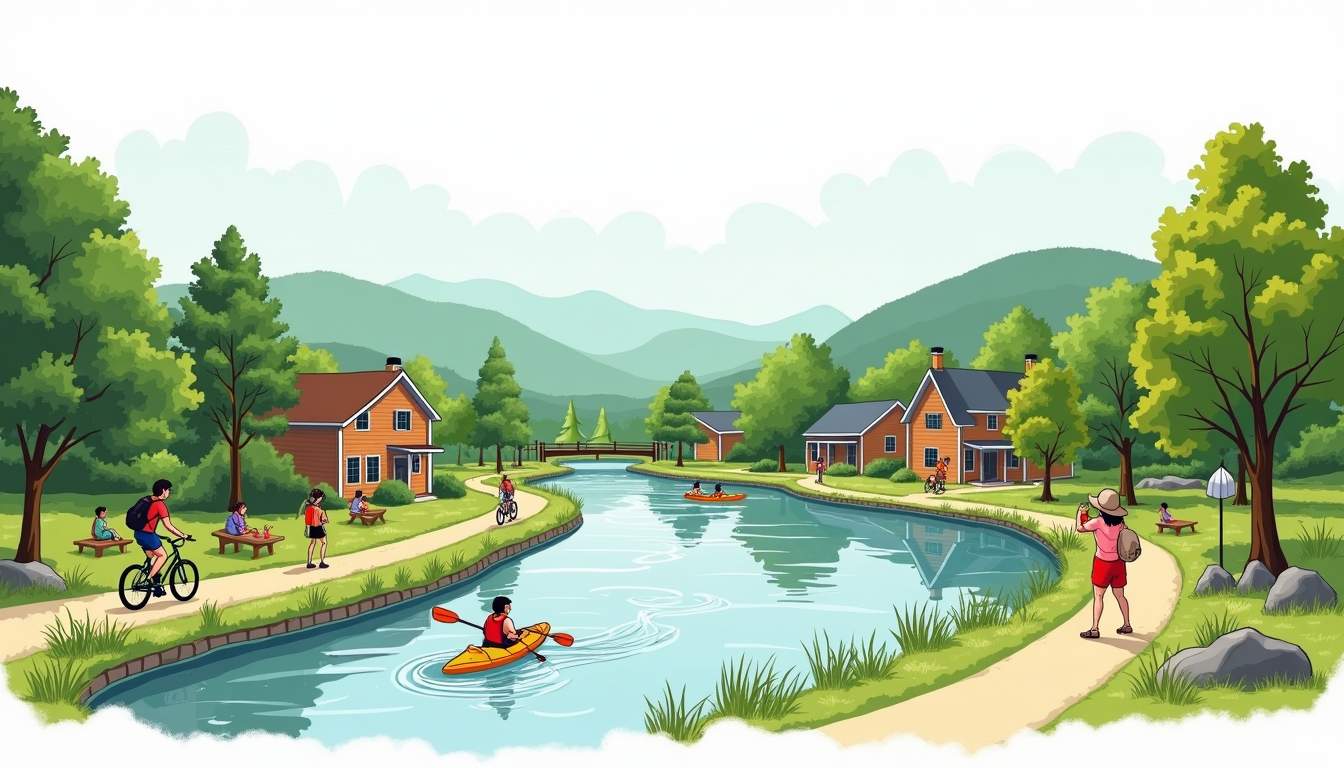
The Water Trail neighborhood in East Tennessee blends riverside living with community convenience, outdoor recreation, and easy access to regional hubs. Designed around a series of protected greenways and a navigable stretch of water, the neighborhood appeals to families, retirees, and outdoor enthusiasts who want a balance between natural scenery and modern amenities.
Water Trail is located in the eastern portion of Tennessee, within reasonable driving distance of several mid-sized cities. The development sits along a tributary that feeds into a larger river system, offering waterfront parcels and homes with views of the surrounding hardwood forest.
Major highways and state routes provide straightforward access. Commuters can reach nearby employment centers in 20–45 minutes depending on traffic, while regional airports are generally within an hour’s drive. Public transportation options are limited, so most residents rely on personal vehicles.
The area benefits from scenic drives, especially during the fall when the foliage creates a vibrant tapestry of colors along the waterways and hills. Additionally, biking and hiking trails are available close by for outdoor enthusiasts who prefer to explore the region on foot or by bike rather than by car. These trails offer an immersive experience in the natural beauty surrounding the Water Trail community.
For those who enjoy boating or fishing, several public boat ramps along the larger river provide easy access for watercraft, and local marinas offer rental and storage options. This makes it convenient for residents and visitors to take full advantage of the extensive aquatic environment, whether for weekend recreation or everyday relaxation.
Homes in Water Trail range from modest single-family houses to larger custom builds on waterfront lots. Architectural styles favor craftsman, farmhouse, and contemporary interpretations that complement the natural setting rather than overwhelm it.
Lot sizes vary, with some properties offering private docks or easy access to shared launch points. Newer sections of the neighborhood include eco-conscious design features such as native landscaping, rain gardens, and low-impact driveways, which help preserve the local watershed and reduce stormwater runoff.
Many homes incorporate expansive windows and outdoor living spaces such as screened porches and decks to maximize views of the surrounding water and wooded areas. These elements create seamless transitions between indoors and outdoors, allowing residents to enjoy seasonal changes and abundant wildlife. Energy-efficient construction methods and materials are increasingly popular to lower utility costs and minimize environmental impact.
Community guidelines encourage designs that blend with the rolling hills and mature tree canopy, promoting a cohesive yet diverse streetscape. Residents appreciate the balance between privacy and neighborhood connectivity, with winding roads and generous setbacks enhancing the area's tranquil atmosphere.
Pricing is competitive for East Tennessee, with entry-level homes priced affordably for first-time buyers and higher-end waterfront properties commanding premium figures. Recent years have seen steady interest as more buyers prioritize outdoor amenities and lower density living after urban lockdowns.
Inventory can fluctuate seasonally, with spring and summer bringing the most activity. Working with a local real estate agent familiar with waterfront and flood-plain considerations is advantageous when evaluating properties in Water Trail.
Investors and families alike find Water Trail attractive, given its combination of recreational opportunities and strong community spirit. Market analysts have noted gradual appreciation in property values, supported by the area's improving infrastructure and nearby commercial developments. Buyers are advised to monitor interest rate shifts and available incentives, which can significantly affect affordability in this sought-after locale.
Furthermore, recent developments include initiatives aimed at enhancing pedestrian pathways and community green spaces, further elevating Water Trail’s appeal to those seeking a lifestyle rooted in nature without sacrificing modern conveniences. These factors contribute to a dynamic market that balances growth with preservation.
The neighborhood center offers a blend of active and passive amenities. A community clubhouse serves as a casual gathering spot for classes, events, and small private functions. Fitness facilities are modest but well-maintained, while walking paths and bike trails weave through conserved woodlands.
Water-focused features are the neighborhood's highlight: shared boat launches, fishing piers, and a series of marked water trails for kayaking and paddleboarding. Designated picnic areas and fire pits provide ideal evening spots for families and neighbors to connect.
Water Trail incorporates a greenway buffer along the river corridor that protects sensitive habitats and provides uninterrupted trail access for non-motorized use. Trails are well-marked and maintained, suitable for casual walks, jogs, and mountain biking on more rugged sections.
Multiple access points to the water make it easy to plan short outings or extended paddling trips. Safety signage and seasonal updates on water levels are posted by the homeowners association to help residents plan activities.
Families will find public and private educational options within a short drive. Elementary and middle schools near Water Trail have good reputations for community involvement and extracurricular programs, while high schools offer a range of sports and vocational training opportunities.
Childcare centers, tutoring programs, and enrichment classes are available in nearby towns, making Water Trail a practical choice for households with young children. Weekend programming through the community center often includes nature workshops, swim lessons, and family movie nights.
Employment in the region combines manufacturing, healthcare, education, and service sectors. Several industrial parks and corporate campuses within commuting distance provide stable job options, while smaller towns nearby support a growing entrepreneurial scene with specialty shops and craft food producers.

Remote work has become increasingly common, and many homes in Water Trail include spaces suitable for home offices. Reliable internet service is available through fiber and cable providers, though residents are encouraged to verify specific speeds for remote work needs before purchasing.
Everyday needs are served by nearby grocery stores, pharmacies, and banks. A short drive brings a wider selection of independent restaurants, coffee shops, and farm-to-table markets that highlight local produce and artisanal goods.
For big-box shopping, specialty medical services, and cultural attractions such as theaters and museums, a regional hub is typically a 20–45 minute drive away. That proximity allows for urban conveniences without the daily bustle.
Outdoor recreation is central to life in Water Trail. Beyond paddling and fishing, residents enjoy hiking, birdwatching, and seasonal pursuits like fall foliage drives and winter nature walks. The ecosystem supports diverse wildlife, and wetland areas are carefully managed to balance habitat needs with recreational access.

Community-sponsored events often include guided nature walks, clean-up days, and beginner paddling clinics. For more adventurous outdoor activities, nearby state parks and national forests offer extensive trail networks and climbing opportunities.
Fishing in the local tributary provides chances to catch smallmouth bass, sunfish, and seasonal runs of larger species. Catch-and-release practices and periodic habitat restoration projects support a healthy fishery.
Boating rules emphasize low-wake zones and restricted horsepower near sensitive shorelines. Life jackets are required for children and strongly recommended for all paddlers. The homeowners association posts updates on water conditions, algae advisories, and erosion concerns during heavy rains.
Community identity in Water Trail leans on an active, outdoors-oriented lifestyle balanced with neighborly connection. Regular events—farmers’ market pop-ups, outdoor concerts in the summer, and holiday strolls—help build relationships among residents.

Volunteerism is common, with residents contributing to trail maintenance, native planting days, and stewardship committees that monitor water quality and wildlife corridors. This involvement fosters a sense of ownership and shared responsibility for the neighborhood’s natural assets.
Prospective buyers should evaluate floodplain maps and review any restrictions tied to waterfront lots. Home inspections in Water Trail often include additional checks for drainage, foundation moisture, and dock conditions where applicable.
HOA fees support common-area maintenance, trail upkeep, and water management programs. Understanding what is included in those fees—such as dock maintenance, lawn care standards, or community insurance—helps avoid surprises after moving in.
Seasonal maintenance is part of waterfront living. Spring storms can affect shoreline stability, and autumn leaf buildup influences culverts and drainage. Regular pruning, native buffer planting, and erosion-control measures reduce long-term maintenance needs.
Winterizing docks, securing outdoor furniture, and checking HVAC systems before colder months contribute to home longevity. Many neighbors coordinate seasonal yard services or swap recommended contractors, making maintenance more manageable for newcomers.
Water Trail tends to hold value, especially for properties with direct water access or clearly preserved natural views. The combination of recreational amenities and thoughtful planning enhances appeal to a wide range of buyers.
Risks that can affect long-term value include changes in water quality, unmanaged development upstream, and fluctuations in regional employment. Active stewardship by the HOA and collaboration with local conservation groups helps mitigate these concerns and support property values.
The Water Trail neighborhood in East Tennessee offers a compelling blend of outdoor access, community programming, and practical living. It is especially well-suited for those who appreciate nature without giving up modern comforts or a sense of neighborhood.
Before making a move, it is sensible to tour the neighborhood at different times of day, speak with current residents, and review HOA covenants and local land-use plans. Armed with that information, prospective buyers can make decisions that align with lifestyle priorities and long-term goals.
If you love the blend of natural beauty and community spirit highlighted in Water Trail, explore the exceptional lifestyle at Tennessee National. Our premier gated community offers luxury living with a Greg Norman Signature Golf Course, private marina, waterfront dining, and over 20 member amenities designed to complement your outdoor lifestyle. Whether you prefer a move-in ready home or a custom build, Tennessee National provides the perfect setting to enjoy resort-style living surrounded by scenic trails and vibrant social activities. Schedule a Private Tour today and start making memories in a community that feels like home.